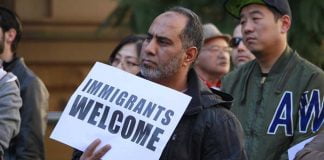Veteran journalist Jeff Waters has authored a new book investigating events surrounding the death in custody of Aboriginal man Mulrunji on Palm Island in late 2004, and the subsequent trial of Sergeant Chris Hurley for his manslaughter. He spoke to Lauren Mellor about the case and about the continuing struggle of Aboriginal people for justice.
Can you describe how policing operated on Palm Island prior to the death in custody and what happened after the protests following Mulrunji’s death?
There is a culture on the island where police feel that they can avoid their own guidelines in their application of the law, because of its remoteness, and because what they do will not be reported.
[The protests were] well and truly over by the time they landed on the island. They clearly should not have declared an emergency situation because there was no emergency.
[The result was] that they [went] about the island without a warrant rounding up people that they believed might be involved in the riot and making arrests by smashing in doors and hauling people off. Police used tasers when they weren’t licensed to, they handcuffed witnesses and they did all this without any identifying markings and so got away with it because nobody could be disciplined. Not that they would have been disciplined because when the Crime and Misconduct Commission (CMC) criticism emerged publicly, [the Police Commissioner] said that [he] simply disagreed with the CMC. And he had the sanctioning of the Police Minister Judy Spence, who subsequently said “I agree with what they did”.
What’s the explanation for the initial decision not to send Sergent Hurley to trial, despite the damning Coroner’s report?
The Director of Public Prosecutions (DPP) has to decide whether to send somebody to trial on the basis of the available evidence. However, that evidence was staggeringly badly gathered, because the investigation had so many errors in it. The police admitted in testimony that they had deliberately departed from their own guidelines because they disagreed with them, and nobody has ever been held to account for that. Hurley’s friend was the Chief Investigating Officer. They had off the record conversations together. Hurley admitted to looking at the video evidence before he was questioned [and] to having off the record conversations with all of the principle witnesses before he was asked to give statements.
Throughout the course of the investigation, inquest and trial there were sizeable protests against what many saw as a miscarriage of justice. What role do you think the protests and political pressure had on the government?
It is clear that the protest movement made Premier Beattie overturn the DPP’s decision. Unfortunately, however, once that happened they’ve forgotten about it, because the trial happened, and it’s easy for those in authority to say it’s all over now.
Lex Wotton is due to be tried on October 6 as a result of the protests on Palm Island. Do you think Palm Islanders are able to receive a fair trial in Townsville? Do you think the conditions of Hurley’s trail were fair?
Was it fair that an all white jury drawn from Townsville were the ones that decided whether Hurley was innocent or guilty? I’ll have to leave it to readers to draw their own conclusions. However, nobody [involved in the case] objected that it might be an unfair trial, and said, why aren’t there any black people in this jury?
Hurley was the first police officer to be brought to trial for a death in custody, and this happened as a result of political pressure. Where does the struggle for justice for indigenous people sit now?
in remote communities will continue to happen and go unreported. The source of the problem is the attitude of police in Indigenous communities and the fact that the rule of law can apply in some parts of the state and not others. Until people are disciplined for the kinds of things that [happened] around this death there won’t be justice. Whether there is justice in Hurley being acquitted, I’m not prepared to say, because to criticise the judicial process can be contempt. But I think the facts speak for themselves.
Gone for a song: a death in custody on Palm Island
By Jeff Waters
ABC Books, $24.95
Jeff Waters has worked as a journalist for 20 years. His recent awards include Queensland Media Awards Best TV Current Affairs Report (2005 and 2006) and Best Radio Current Affairs (2006). He currently works as a senior correspondent for the ABC TV News for Australia Network





